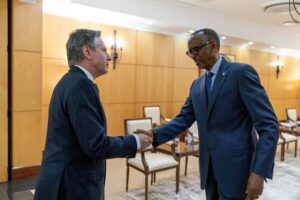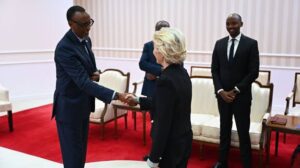The European Union is set to review its raw materials agreement with Rwanda in light of escalating violence in the eastern Democratic Republic of Congo (DRC). However, the bloc has stopped short of imposing immediate sanctions on Rwanda, despite mounting accusations of its involvement in the conflict.
Speaking after a meeting of EU foreign ministers in Brussels, High Representative Kaja Kallas confirmed that the EU’s critical raw materials deal with Rwanda would be reassessed, particularly given the recent advances of the Rwandan-backed M23 rebels in the DRC’s North Kivu province. The rebel group, which seized the key city of Goma in late January before pushing into South Kivu, has drawn widespread international condemnation.
While the EU has opted to revisit its agreement with Rwanda, it has not followed the United States in imposing direct sanctions on Rwandan officials. Instead, Kallas emphasized that the EU had reached a “political decision” to consider sanctions depending on how the situation unfolds.
“We have urged Rwanda to withdraw its troops, and the Memorandum of Understanding on critical raw materials will be under review,” Kallas stated. She also confirmed that EU security and defense consultations with Rwanda had been suspended.
Describing the crisis as “very grave” and on the verge of escalating into a broader regional conflict, Kallas underscored the EU’s stance on territorial sovereignty. “Territorial integrity is non-negotiable, in Congo as well as in Ukraine. The UN charter applies everywhere,” she asserted.
The EU’s critical raw materials deal with Rwanda, signed in February 2023, was part of its broader Global Gateway initiative—a €300 billion infrastructure investment strategy designed to secure crucial resources for technologies like microchips and electric vehicles. Rwanda, a key supplier of tantalum and other essential minerals, was positioned as a strategic partner in the EU’s efforts to reduce reliance on China.
Also, read: Sacred Afro-Brazilian Cleansing Ritual Sets the Stage for Rio’s Carnival Festivities
However, with Rwanda facing fresh accusations of exploiting Congolese mineral reserves through its support of M23 rebels, the EU has come under increasing pressure to reconsider the deal. Belgium, the former colonial ruler of the DRC, was the first to push for suspending the agreement, a move that was later backed by the European Parliament.
The controversy stems from long-standing allegations that Rwanda smuggles minerals extracted from the DRC’s conflict zones into its own supply chains. Experts argue that Rwanda’s official mineral exports far exceed what the country’s own geological reserves could realistically produce, reinforcing claims that much of its output is sourced illegally from Congolese mines.
“When you look at Rwanda’s geological composition, it’s simply not possible that they mine what they export,” noted Guillaume de Brier of the International Peace Information Service (IPIS), echoing similar concerns raised by the U.S. Department of State last year.
Kallas’ announcement signals a shift in the EU’s relationship with Rwandan President Paul Kagame, who has traditionally maintained strong ties with European leaders. Despite Rwanda’s involvement in the DRC conflict, the EU has continued to support Rwandan military efforts in other regions, including the fight against Islamist insurgents in Mozambique’s oil-rich Cabo Delgado province. Just last November, the EU allocated an additional €20 million to support Rwandan forces in the region under the European Peace Facility.
As Brussels reassesses its agreement with Kigali, questions remain over the EU’s broader strategy in Africa. The review of the raw materials deal marks a significant moment in European foreign policy, as the bloc weighs economic priorities against growing geopolitical tensions in Central Africa.

